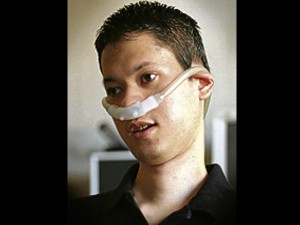Giving the rare disease world new hope

MAGDARAOG has been a staunch patient-advocate to educate public about Pompe disease and other rare health conditions.
Those browsing the Internet wanting to gather information on rare diseases would somehow be led to one site that tells a story of 30-year-old Juan Magdaraog.
Magdaraog was about 10 when he showed signs of muscle weakness, making things like walking or sitting up a huge challenge for him.
The doctors thought it was muscle dystrophy although they were not really sure. It was five years later, while seeing a muscular dystrophy specialist in San Francisco, USA, that he finally knew what ails him—Pompe disease.
The sad news is, little is known about Pompe disease except that it is rare, inherited and disables either the heart or skeletal muscles. Those afflicted with the condition often develop respiratory weakness later in life.
It is also expensive to manage considering one needs a team of specialists such as cardiologist, neurologist and respiratory therapist.
Article continues after this advertisementFortunate
Article continues after this advertisementOne would consider Magdaraog fortunate as he has the full support of his family. In fact, he was able to keep his condition at bay, enabling him to finish college—he is an Industrial Design graduate from the De La Salle-College of Saint Benilde—as well as work for a local outsourcing company as a front-end Web developer.
Also a creative director for a small start-up company he founded, Magdaraog has always been a patient-advocate of the Philippine Society for Orphan Disorders (www.psod.org.ph), a nonprofit organization that aims to help individuals in the Philippines who suffer from rare disorders.
The organization is unique in scope as it deals with rare diseases, which affect at least one in every 20,000 individuals.
Aside from Pompe disease, Cornelia de Lange syndrome, Maple Syrup Urine disease, Menkes syndrome, Rett syndrome and Wilson disease are just some of the conditions locally diagnosed in the Philippines.
200 Filipinos
The Institute of Human Genetics of the National Institutes of Health of the University of the Philippines Manila has identified over 200 Filipinos, mostly children, afflicted with over 20 rare disorders.
Since 1991, a handful of medical professionals from the IHG have been attending to patients like Magdaraog, dedicating themselves to create awareness in the country and to undertake clinical trials to contribute to the body of world knowledge that would lead to improving the health of Filipino patients with rare disorders.
According to Cynthia Magdaraog, Juan’s mother and president of PSOD, these dedicated doctors and experts have been relentlessly sourcing the much-needed funds from foreign and local donors, as well as arrange with drug companies to make available under compassionate use the special food formulas, medications and enzyme replacement therapies crucial to sustaining and improving the health condition of patients.
So few people
Considering that many of these rare diseases affect so few people, most researchers and pharmaceutical companies do not find it beneficial to spend the time, effort or money to find treatments and cures.
However, a number of companies believe otherwise, noting that rare disease sufferers also deserve the full focus of researchers and the pharmaceutical companies. This shift to focus on rare diseases should bring hope to many patients who feel neglected by the industry.
These companies include Gynzyme Corp., a fully owned subsidiary of sanofi-aventis, which developed Myozyme, the first specific treatment for Pompe disease. This type of medication is known as an enzyme replacement therapy, which is not a cure—it does not correct the underlying genetic defect—but replaces an enzyme that is missing or markedly deficient in individuals with Pompe disease.
Rare Disease Week
To further protect, promote the rights, and to enable access to timely information and adequate medical care of individuals suffering from rare diseases, the Presidential Proclamation 1989 was signed in February 2010, declaring the last week of February of every year as the “National Rare Disease Week.”
Now on its 3rd year, the National Rare Disease Week (happening from Feb. 22 to 29) carries the theme “Solidarity: Rare but Strong Together” and invites all its members to also join their counterparts around the world in observing the 5th World Rare Disease Day on Feb. 29.
Given the rarity of both patients and experts, PSOD believes that most actions related to rare diseases have to be performed in cooperation between different countries, regions and levels.
Dr. Carmencita D. Padilla, PSOD chair and IHG director, agrees saying that progress for the benefit of rare diseases patients can only be achieved through close international cooperation.